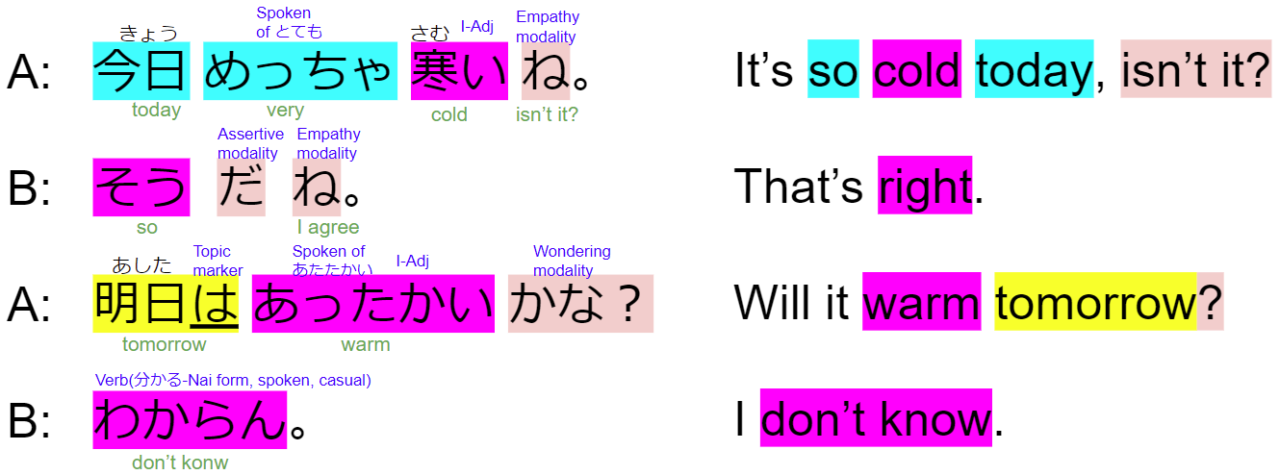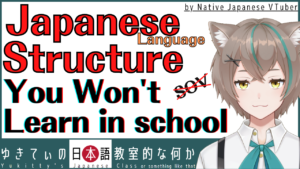

 Yukitty
YukittyI will explain the detailed grammar later, so even if you do not understand everything on this page, it is enough if you can feel the atmosphere of Japanese.
Japanese sentence structure is very simple.
Japanese sentences consist of only 3 parts, Predicate, Modifier, and Modality.


A word or phrase that is used with another word or phrase to limit or add to its meaning.
In grammar, the part of a sentence contains the verb* and gives information about the subject.
*The Japanese Predicate contains either a verb, adjective, or noun.
About a speaker’s or a writer’s attitude towards the world. A speaker or writer can express certainty,
possibility, willingness, obligation, necessity, and ability by using modal words and expressions.
Reference: https://dictionary.cambridge.org/us/



For instance, the following sentence has 3 Modifiers, 1 Predicate, and 1 Modality.




A modifier consists of a noun or noun phrase plus a case particle.


The case particles have the following main meanings.
| The case particles | Examples of usage (meanings) |
|---|---|
| _____が | The subject of state/action etc. |
| _____を | The object of action etc. |
| _____に | Destination, Time, etc. |
| _____で | Location, Method, etc. |
| _____と | Together, Quotations, etc. |
| _____へ | Direction, Recipient, etc. |
| _____から | The starting point, Cause, etc. |
| _____より | Sender, Comparison, etc. |
| _____まで | Limit of time/place etc. |
The meaning does not change even if the modifiers are interchanged. Usually, you put the words in the order you want to emphasize them.


The most natural word order is (1)when (2)where (3)who (4)what (5)how.


A topic consists of a noun or noun phrase plus an adverbial particle.


The adverbial particles have the following main meanings. Topics are a kind of modality.
| The adverbial particles | Examples of usage (meanings) |
|---|---|
| _____は | Topic, Contrast, etc. |
| _____なら | Contrast, Correlation, etc. |
| etc. | etc. |


Only Verbs, I-adjectives, Na-adjectives, and Nouns can be predicates.
海賊王に 俺は なるっ!*
ONE PIECE (C)尾田栄一郎/集英社・フジテレビ・東映アニメーション
Kaizoku ouni orewa naru!
I’m going to become the pirate king! *Predicate (Verb)
この 世界は 残酷だ。* そして、 とても 美しい。*
進撃の巨人 ©諫山創・講談社/「進撃の巨人」製作委員会
Kono sekaiwa zankokuda. Soshite totemo utsukushii.
This is a cruel world. And yet so beautiful. *Predicate (Na-Adjective) *Predicate (I-Adjective)
私の 戦闘力は 53万です。*
ドラゴンボール ©バードスタジオ/集英社・東映アニメーション
Watashi no sentouryoku wa gojuusanmandesu.
My power level is 530,000. *Predicate (Noun)


Auxiliary verbs and sentence-ending particles can be modality.
Modality represents the speaker’s feelings and thoughts about a matter and his or her intentions toward the listener.


| Auxiliary verbs | Core of meanings |
|---|---|
| だ、(です、ます) | assertion, (+politeness) |
| らしい、ようだ、みたいだ、そうだ | conjecture, hearsay |
| だろう、でしょう | non-conclusion, guess |
| はずだ、ちがいない | confidence |
| のだ、わけだ | description |
| べきだ、なければならない/いけない | necessarily, duty |
| Ending particles | Core of meanings |
|---|---|
| か、かな、かしら | question, wondering |
| よ、ぞ、ぜ、さ、わ | notification, informative |
| ね、よね | asking for consent, empathy |
| な、なあ | admire |



And more other particles exist.
There are many, so I will omit them from this article.
e.g. A casual conversation with a good friend.


In Japanese, Other than predicates in the sentence, they are all predicate modifiers.
Predicate modifiers can be omitted. Only the predicate cannot be omitted.
(Modifier 1 + Modifier 2 + … +) Predicate (+ Modality1 + Modality2 + …) 。
Especially, the subject is almost omitted in Japanese sentences.
Especially if the subject in the situation is obvious, it has about 98% chance of being omitted in my experience. In other words, if the subject is not omitted in many sentences, the Japanese will be unnatural for native speakers.
気持ち悪い。*
新世紀エヴァンゲリオン ©カラー/Project Eva.
It’s disgusting. *Predicate (I-Adjective)
(それが* )気持ち悪い。 *それが is omitted. “It” in Japanese is always omitted.
駆逐してやる!*
進撃の巨人 ©諫山創・講談社/「進撃の巨人」製作委員会
I’m going to exterminate the titans! *Predicate (Verb)
(俺が* )(巨人を* ) 駆逐してやる! *俺が and 巨人を are omitted. Because in this situation, they are obvious.
You can switch the word order. In Japanese sentences, the Case particles* function instead of the word order of English. But the Predicate must always be at the end of the sentence, except for special expressions.
*A case particle is attached to the end of the other than predicates.
_____が _____を _____に _____と etc.
海賊王に 俺は なるっ!*
ONE PIECE (C)尾田栄一郎/集英社・フジテレビ・東映アニメーション
I‘m going to become the pirate king! *Predicate (Verb)
It is not wrong word order, and the first word of the sentence “海賊王に” is emphasized.
However, the most natural word order is (1)when (2)where (3)who (4)what (5)how.
e.g. (私は*) 今日 学校で 友達と テニスを した。 *私は should be omitted in most cases
I played tennis with my friends at school today.



I think these patterns are not so important.
So, for your reference below.
The sentence structure is divided into 10 patterns below.
-All verbs end with the sound “u”.
花が 咲く。
The flowers bloom.
犬が 餌を 食べる。
The dog eats food.
台風が 日本に 近づく。
The typhoon approaches Japan.
人類が 宇宙人と 戦う。
Mankind fights aliens.
猫が 外国人に 日本語を 教える。
The cat teaches Japanese to foreigners.
All I-adjectives end with the sound “i”.
海が美しい。
The sea is beautiful.
友人がアニメに詳しい。
The friend is familiar with anime.
All Na-Adjectives end with the sound “na”, but if the Na-Adjective is at the end of the sentence, the last sound will be “da”.
外が静かだ。
It’s quiet outside.
電車が時間に正確だ。
The train is accurate in time.
All Nouns end with the sound “da” or “desu”, but there are some exceptions.
彼女が担当者だ。
She is the person in charge.


この記事が気に入ったら
フォローしてね!
Comment